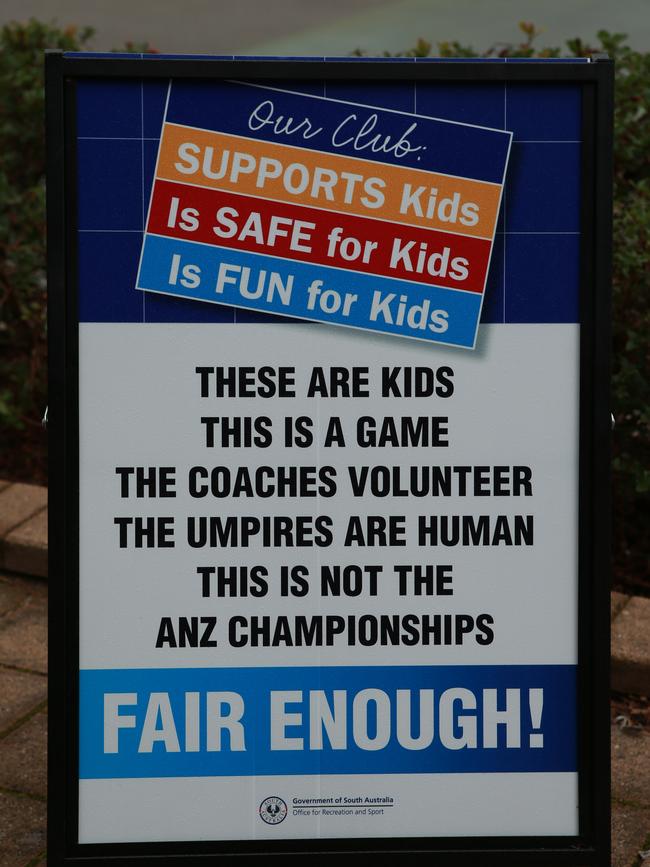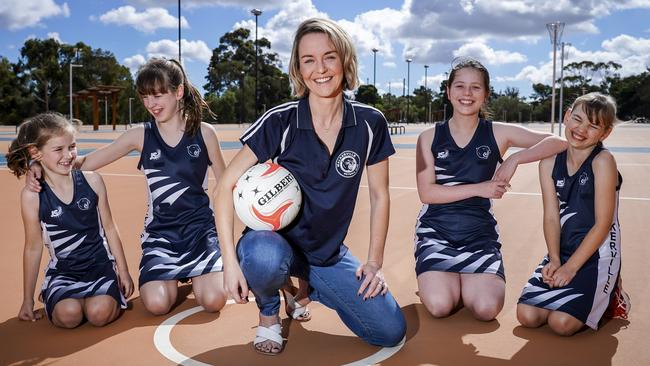‘Parents can be the best, and the worst, of children’s sport’: How kids are being turned off sport
The antics of badly-behaving parents can be awkward and embarrassing but the ‘ugly parent syndrome’ is turning kids away - here's how not to be that kind of parent.
SA News
Don't miss out on the headlines from SA News. Followed categories will be added to My News.
- Ugly sport parents assault their kids’ childhoods
- South Australian sport stars join Fair Enough campaign
It’s been dubbed the “ugly parent syndrome” and anyone who has spent any amount of time on the sidelines of kids’ sport knows it well — but now there is a renewed push to stamp it out, for very good reason.
The saliva-spitting, foul-mouthed footy dad hurling abuse at the opposition Under 9s.
The self-righteous mother angrily reefing a netball bib from a young player at half time to put it on her own daughter instead, who she thinks should have been selected for the position all along.
The mild-mannered professional who turns into a raving lunatic game day, whenever he slips on the fluorescent coach’s vest.
While the antics of badly-behaving parents can be awkward and embarrassing, it is the high dropout rate of young teenagers from organised sport, tipped to be as many as 250,000 kids in Australia this year, that is concerning experts here — and around the globe — most.
The US National Alliance for Youth Sports estimates 70 per cent of all kids aged 12 to 14 will quit playing sport, listing the sideline behaviour of adults as a top contributing factor to why the youngsters no longer find playing it fun.

So fed up by the bad behaviour of parents in his country is one youth soccer referee that he has set up a Facebook page to upload videos of unruly parents and spectators at youth sports events.
“I do it to hold people accountable … it’s a very visual deterrent, and not just to the person caught on video but to others who ask themselves: ‘Do I look like that jerk?’,” says Oklahoma’s Brian Barlow, 44.
Closer to home, this year the SANFL has rolled out the Sammy D Foundation’s Monkey See Monkey Do program to 26 of its junior clubs next month, the sessions aimed at educating parents on how their behaviour can negatively impact on their kids.
“Unfortunately unrealistic expectations of players, coaches and parents can lead to violent outbursts on and off the field or court,” says Brigid Koenig, the general manager of the SA-based organisation set up to eradicate violence and bullying.
“Every year there are serious sport-related violent incidents involving players, parents and spectators. “In SA alone there have been junior players banned for on-field violence, an under 13 netball match was abandoned and police called in, in response to a spectator brawl, and more than 50 cases of verbal abuse and physical assault of referees were reported across one soccer season, across all teams.”

Researchers say the motivators for poor parental behaviour are complex and varied, from mums and dads wanting to live their sporting dreams vicariously through their kids, to simply being time poor and stressed.
University of SA’s exercise and sport science program director Alyson Crozier says her research has even unveiled a socially-driven link.
“For parents who build their social life through their child’s sport there is a strong desire to protect that position, so they want their child to do well so they can continue being part of that community,” she says.
Dr Crozier says there is anecdotal evidence suggesting some behaviours are getting worse and the increasing professionalism of junior sport may be a driving factor.
“With the early specialisation and professionalism of sport in the youth population (we are seeing) more videoing of games, more match reports and a greater emphasis on winning (and this) changes parents’ behaviour to some extent — they want their children to perform well and win so they can continue playing,” she says.
“We are seeing youth drop out of sport between the ages of 12 to 15 (girls a bit younger than boys) and one of the issues is the limited opportunities to access alternative sports where the focus is on fun and enjoyment.
“When we look at children’s reasons for playing sport, the top-rating reason is for fun and to be social and to make friends — winning is rated much lower in terms of why they play sport.
“Of course winning is a part of sport — one team wins, one loses — but I think the key is to reduce the importance or emphasis on it and focus more on fun and development and working hard, working your hardest, putting your best effort in.”
Because, she argues, the bigger picture is more important.
“We need to understand that children and youth who are involved in sport, even if they don’t go on to be elite athletes, are gaining so many positive life skills through being part of sport — teamwork, friendship, leadership, confidence, competence in their skills,” she says.
Parents’ role in keeping kids wanting to be involved in sport has long been a focus of Flinders University’s Sam Elliott, a lecturer in sport, health and physical activity.
“Parents can be the best, and the worst, of children’s sport,” says Dr Elliott, whose Sport Parent Project won a national universities’ award early this year.
“They are the most loyal, diehard, one-eyed fans, and yet, parents can also be the harshest critics, the worst of losers and the poorest of sports — there is clear evidence that at its most extreme, (problematic parental behaviour) will indirectly result in burnout, (or) a psychological divorcing from the sport.”
Dr Elliott believes the solution lies beyond codes of conduct, punitive measures and initiatives such as “silent Saturdays” where parents and coaches are asked to refrain from giving instructions that are being embraced by many clubs and organisations.
“My research has found we need a new approach … there are a range of stresses that present on a daily and weekly basis for parents (and) really the conversation and research right now is how do you find ways to support parents to manage those stresses,” he says.
“Not enough parents are equipped with the skills to maximise support and encouragement, necessary for promoting sustained sport involvement … this will help to maximise participation and help reduce the economic burden of physical inactivity in Australia, which is an estimated $555 million per year.”

Dr Elliott believes collaboration and communication is key — both from a club perspective to coaches and parents as well as between parents and their kids, saying it can be challenging for those not previously involved with children’s sport.
“At an individual level, making sure you are engaged regularly in conversation with your child to share and communicate goals together really is key,” he says.
“(But) most parents do an outstanding job in sport … there are fantastic things parents do and continue to do and that should not be forgotten.”
SANFL Junior Umpiring Manager Barry Oates, who has been umpiring for 35 years, agrees there are many positive signs, saying umpire appreciation activities that have been brought in pre-game at the junior level are proving beneficial and helping to nurture and grow respect.
“I am a parent myself, we like to see our own children do well, but people just need to appreciate umpires are human — within our junior competition, the majority of our young umpires are actually players within the same competition, just because he is wearing his umpire’s shirt and not wearing his footy jumper, he is still the same person,” he says.
SANFL State Coaching Manager Dave Reynolds says his organisation is committed to working with its community clubs and has a particular focus on supporting and educating parent coaches.
“(Coaches) are the biggest role model at a football game and any act or behaviour a coach makes is deemed as acceptable by players and parents and, therefore, is likely to be copied — a coach is the biggest driver of creating the culture of a team and club,” he says.
He says several clubs, such as Goodwood Saints Football Club in Adelaide’s inner south, are setting high standards for their coaches and other officials.
Saints president Craig Scott says all players and their parents are required to sign a player behaviour document pre-season and the introduction of a match day official (MDO), whose role includes monitoring parent and spectator behaviour, has also helped.
“The implementation of the MDO has made a big difference but ultimately it is about the culture your club instils and the standards you are willing to accept — I would hope that any behaviour would be pulled up by another parent before a MDO has to step in,” he says.
MORE NEWS
The SA schools using sporting greats to coach kids
School trips burning $10,000 holes in parents' pockets
Tricks online predators use to lure our kids
Young netballers to do club proud
When Walkerville Netball Club’s first ever junior sides take to the court next weekend, they’ll do so with the expectations of the club firmly in mind — the young players’ parents will also be on notice.
Club president Jessica Nicholls says the committee put a lot of thought into devising a code of conduct for the newly-formed junior side. “Being upfront about our expectations puts everyone on notice about what is expected of our players, parents and supporters and enables us to take swift action if any of those standards are not being met,” she says. “I spoke to all parents before tryouts commenced about WNC’s culture and our zero tolerance policy for inappropriate conduct.
“We want to ensure our players support one another on the court … even passive aggressive behaviour won’t be tolerated — a player shouting out ‘watch your passes’ with a passive aggressive tone after a teammate makes a mistake isn’t helpful.”

The club will initially field seven junior sides, with players ranging in age from six to 17 and registrations are being taken on a “first in, best dressed” basis.
“One of the stories I often hear (concerning kids and sport) is that ‘it’s all about who you know’ — in other words, preferential treatment for some kids over others, due to parent connections,” Ms Nicholls says. “(We believe) it is extremely important kids are inspired to play team sport — team sport is about community, team work and friendship … it can help develop a child into a well-rounded adult who understands hard work, dedication and working together for a common goal. ”
“It is imperative that children are introduced to sport in a positive environment so that they have an amazing experience,” agrees Netball SA general manager Lizzie Bermingham.


